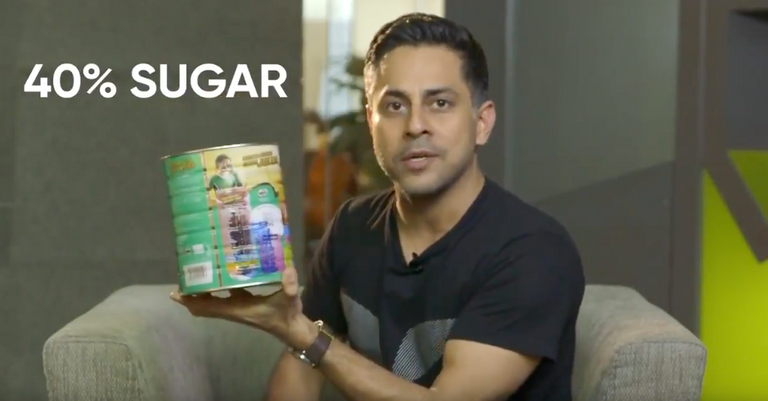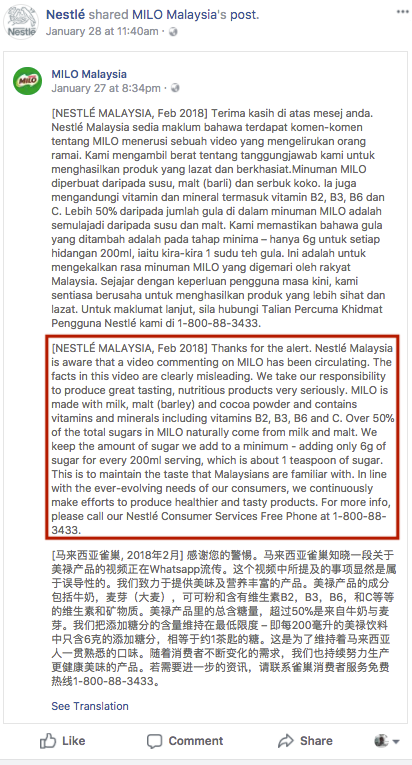
Backstory (first video)
The whole fanfare started when Vishen Lakhiani read an article from the New York Times, labelling our country (Malaysia) as Asia fattest country.
He felt sick to the stomach after reading the article and made the viral video exposing Nestlé.
His accusation is mainly revolve around Nestlé’s role in launching false advertising with one of their most popular product in Malaysia — Milo
Note: Milo is EXTREMELY popular in Malaysia.
That Facebook video, naturally caused a tremendous uproar among the Malaysians.
In fact, around one million people watched the video with 17,000 people shared it.
That caused Nestlé responded back with this press release published in their Facebook page:

Vishen hits back with a follow-up video (watch below), citing multiple evidences against Nestlé false advertisement campaigns
- Milo is not a health drink; despite what Nestlé claimed it to be in various ads
- How sugar is bad for our kids’ health
- How Nestlé is screwing milk
- How Nestlé is screwing breakfast
- How Nestlé used sugar to get their customer addicted, and eventually buy more
- How Nestlé other products are not actually environmental-friendly
- Brought out Nestlé mission statement and scrutinisez it
What do you think Steemians?
Please share me your thoughts on the comments below
If you find the content useful, please upvote, comment, resteem, and follow. Thank you!

I've discussed it with my friends and family and actually found it shooting from the hip, to be honest. Yes, the message got across and it really started conversations, which was why my friends and family had those conversations. But we found the message in the first video quite confused, is he targeting sugar? Milo? Nestle? Government corruption? Misleading marketing strategies? He should have stopped at just targeting sugar THEN suggesting a real alternative, not just attack attack attack then promote a program that isn't really an alternative to Milo. It just seems like a cheap sales strategy of cutting another company down to promote his own.
He clarifies in his 2nd video that "Nestle missed the point, we are talking about their misleading marketing info" (paraphrased). Which I think could have been handled better. Instead of continuing the attack, Vishen could have taken the bigger man's stance and say, "Let's put all this behind us, let us here in Mindvalley work with your/Health Ministry to change the habits of Malaysia"
All this is my personal opinion, I work for Mindvalley and greatly love and appreciate the company and Vishen. Overall, I still do think this whole campaign is positive. For it to have started such a fervent conversation in Malaysia is creating an impact in itself.
I'm surprised this came out of from someone who work for Mindvalley.
Kudos for you @chuazm for being so honest and unbiased.
I totally agreed with you that Vishen could be more proactive in offering more objective solutions, rather than leverage the hype to promote his company's masterclass (his first video).
Having said that, he's a brilliant marketer, and regardless of his true intention, he did start a conversation which I think is valid when it comes to Nestlé (falsely?) positioning their products towards the healthier sector.
At the very least, parents would think twice when it comes to feeding their kids products from companies like Nestlé.
Thanks for this. I'm a heavy consumer of nestle products and always wondered about the complete difference in Australian Milo and Malaysian Milo. Even the powder is different.
As a kid in show biz, I always wanted to be on a Milo advert. A billboard on the LDP. The fact is I can clearly remember my mindset at that age and I think it grows deeper than just a drink in the morning. It's completely managed engulf children into believing in a super drink. Good luck Redbull, Goodluck Lipton.
Ah do elaborate more on your mindset when you were younger. Do you perceive the drink as a healthy drink, energy drink, etc?
I used to work for Nestle in their Stouffers branch, and they always have advertised they dont use preservatives. Well alot of the stuff they put in the food like sugar is used as a preservative. And some of the ingredients they get from their vendors will have preservatives in that too.
Exactly what the conversation is about — false advertisement. Glad to have some insights from someone who worked in Nestlé before.
THANK YOU SO MUCH @gaman <3